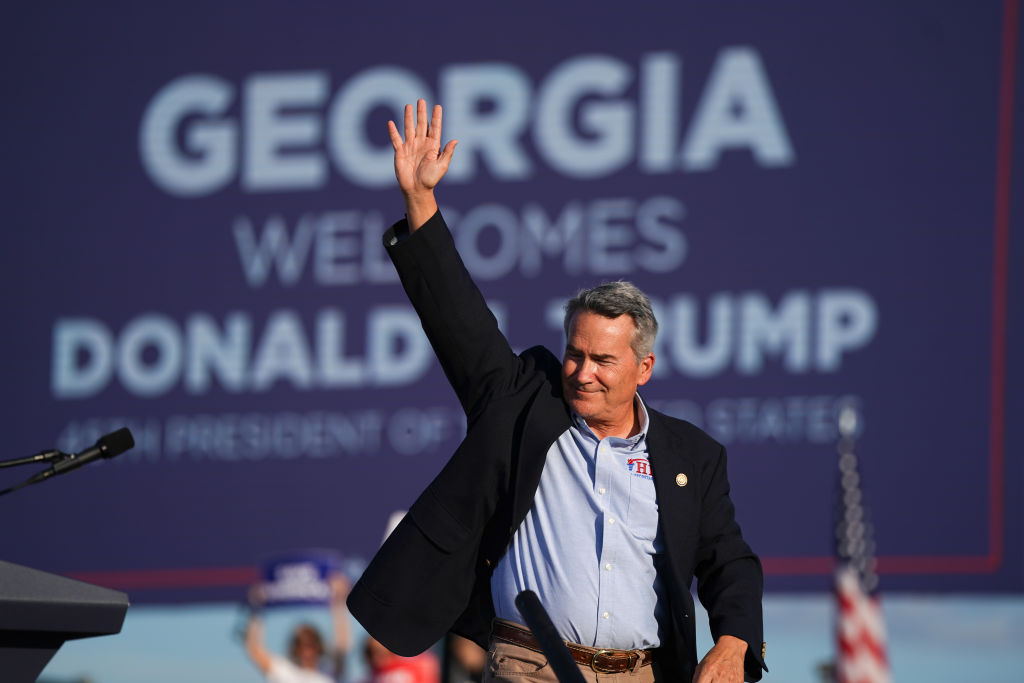Trump's stolen election claims drive record fundraising in secretary of state races


A free daily email with the biggest news stories of the day – and the best features from TheWeek.com
You are now subscribed
Your newsletter sign-up was successful
Former President Donald Trump's baseless claims that widespread voter fraud cost him the 2020 election are raising the stakes in swing-state secretary of state races, with Democratic and Republican candidates alike pulling in record-breaking fundraising hauls, HuffPost reports.
As President Biden pushes his voting rights bills in Congress and Republican-controlled state legislatures pass new election security laws, secretaries of state — who oversee statewide elections — find themselves in the national spotlight like never before.
According to an analysis from the Brennan Center for Justice, secretary of state candidates in Georgia, Michigan, and Minnesota have "collectively raised 2.5 times more than candidates had at a comparable point in 2014 or 2018 election cycles," writes HuffPost.
The Week
Escape your echo chamber. Get the facts behind the news, plus analysis from multiple perspectives.

Sign up for The Week's Free Newsletters
From our morning news briefing to a weekly Good News Newsletter, get the best of The Week delivered directly to your inbox.
From our morning news briefing to a weekly Good News Newsletter, get the best of The Week delivered directly to your inbox.
In a statement posted on his website Monday, Trump claimed Georgia and Michigan are states in which "the fraudulent and irregular votes are massive." The following day, he released another statement falsely asserting that "Biden actually lost BIG in Georgia."
Trump lost both states in 2020.
The Brennan analysis also notes that the best-funded candidate in the Georgia race, Jody Hice, is also the field's most vocal supporter of Trump's stolen election narrative. "I believe if there was a fair election, it would be a different outcome," Hice told CNN in May. When asked if he believed Trump won Georgia, his response was "Absolutely."
Bee Nguyen, a Democrat running for Georgia secretary of state, tweeted Wednesday that she is running to prevent "the subversion of our democracy" and "uphold the will of the people."
A free daily email with the biggest news stories of the day – and the best features from TheWeek.com
During a Tuesday interview with NPR, Trump was asked whether he would only offer his endorsements to candidates in the 2022 midterms who supported his claims about the 2020 election. Trump's reply was evasive. "What they have to do, they're going to do," the former president said before cutting the interview short.
Grayson Quay was the weekend editor at TheWeek.com. His writing has also been published in National Review, the Pittsburgh Post-Gazette, Modern Age, The American Conservative, The Spectator World, and other outlets. Grayson earned his M.A. from Georgetown University in 2019.
-
 Will increasing tensions with Iran boil over into war?
Will increasing tensions with Iran boil over into war?Today’s Big Question President Donald Trump has recently been threatening the country
-
 Corruption: The spy sheikh and the president
Corruption: The spy sheikh and the presidentFeature Trump is at the center of another scandal
-
 Putin’s shadow war
Putin’s shadow warFeature The Kremlin is waging a campaign of sabotage and subversion against Ukraine’s allies in the West
-
 Judge orders Washington slavery exhibit restored
Judge orders Washington slavery exhibit restoredSpeed Read The Trump administration took down displays about slavery at the President’s House Site in Philadelphia
-
 Kurt Olsen: Trump’s ‘Stop the Steal’ lawyer playing a major White House role
Kurt Olsen: Trump’s ‘Stop the Steal’ lawyer playing a major White House roleIn the Spotlight Olsen reportedly has access to significant US intelligence
-
 Hyatt chair joins growing list of Epstein files losers
Hyatt chair joins growing list of Epstein files losersSpeed Read Thomas Pritzker stepped down as executive chair of the Hyatt Hotels Corporation over his ties with Jeffrey Epstein and Ghislaine Maxwell
-
 Judge blocks Hegseth from punishing Kelly over video
Judge blocks Hegseth from punishing Kelly over videoSpeed Read Defense Secretary Pete Hegseth pushed for the senator to be demoted over a video in which he reminds military officials they should refuse illegal orders
-
 Trump’s EPA kills legal basis for federal climate policy
Trump’s EPA kills legal basis for federal climate policySpeed Read The government’s authority to regulate several planet-warming pollutants has been repealed
-
 House votes to end Trump’s Canada tariffs
House votes to end Trump’s Canada tariffsSpeed Read Six Republicans joined with Democrats to repeal the president’s tariffs
-
 Bondi, Democrats clash over Epstein in hearing
Bondi, Democrats clash over Epstein in hearingSpeed Read Attorney General Pam Bondi ignored survivors of convicted sex offender Jeffrey Epstein and demanded that Democrats apologize to Trump
-
 El Paso airspace closure tied to FAA-Pentagon standoff
El Paso airspace closure tied to FAA-Pentagon standoffSpeed Read The closure in the Texas border city stemmed from disagreements between the Federal Aviation Administration and Pentagon officials over drone-related tests
